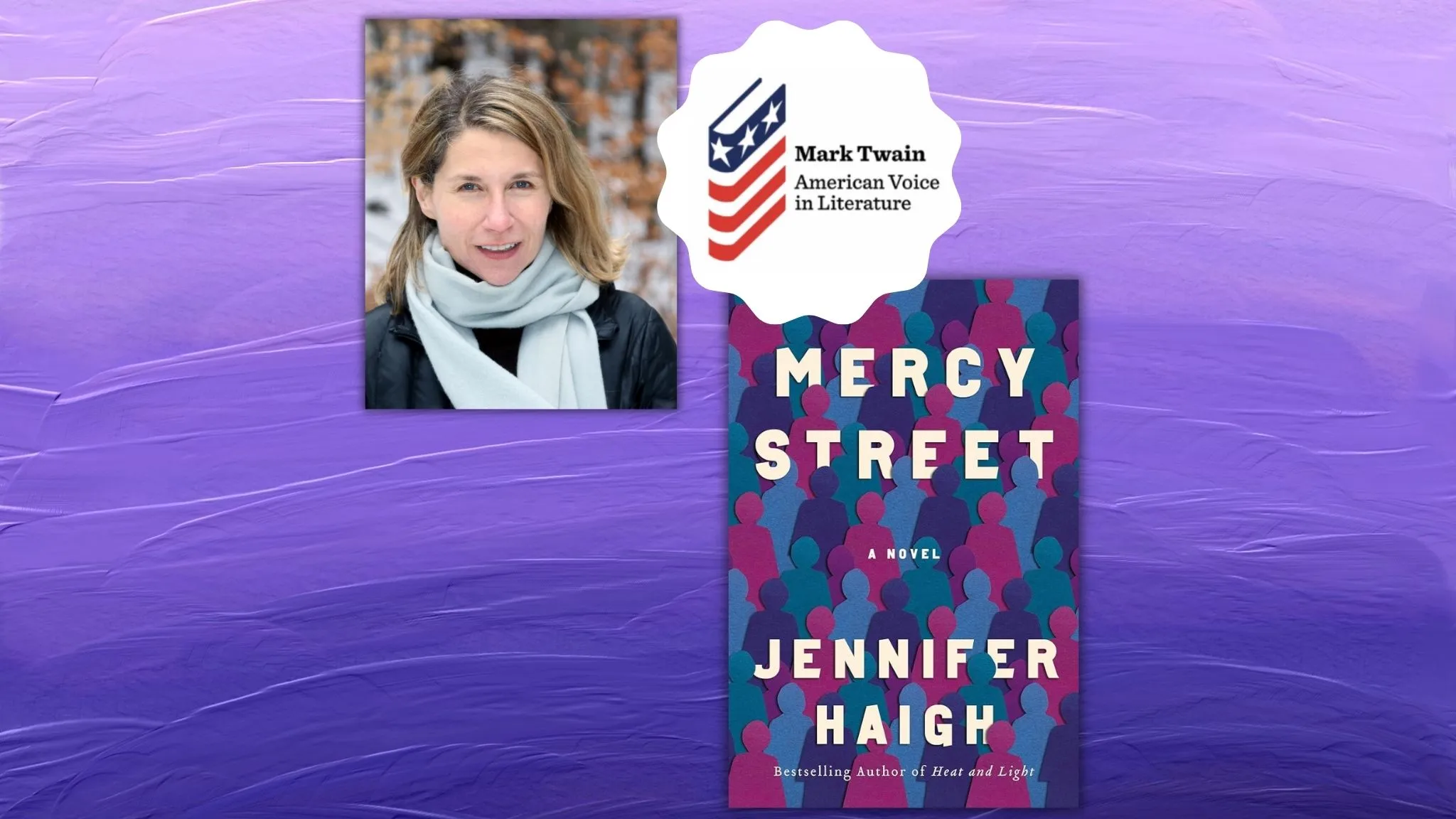This is the first in a series of interviews with previous winners of the Mark Twain American Voice in Literature award, for which BookTrib is a proud partner. First presented in 2016, this award honors a work of fiction from the previous calendar year that speaks with an “American Voice” about American experiences. November 1 is the 2024 American Voice in Literature Award Celebration! View the 2024 award long list here.
The Mark Twain American Voice in Literature Award is an annual honor bestowed on a work of fiction that tells an American story in a distinctly American voice. Supported by the generosity of novelist David Baldacci, and administered by the Mark Twain House & Museum, the MTAVL awards a prize of $25,000 to the winning author. Last year’s honoree was Jennifer Haigh, for her novel, Mercy Street.
Mercy Street weaves together the stories of four characters linked in a web centering on the Mercy Street Clinic for Women’s Health, a Boston facility that provides abortion services. The novel’s characters include a social worker at the clinic; a devout Catholic who protests there; and a white supremacist on an ominous crusade. The judges on the MTAVL panel praised Mercy Street for its “vibrant” narrative voice, calling it “hard-hitting and grounded in the ordinary… a novel that explores a burningly topical American issue with intelligence, sympathy and skill.”
Haigh, 55 and a resident of Boston, is the author of five previous novels, including Mrs. Kimble (2003), which won the PEN/Hemingway Award for outstanding debut fiction, as well as Baker Towers (2005) and Heat and Light (2016), both set in the fictional Western Pennsylvania town of Bakerton. Mark Twain House Board member Rand Richards Cooper, who oversees the MTAVL Award, recently caught up with Jennifer Haigh and discussed her prizewinning novel.
Rand Richards Cooper: Jennifer, we’re so glad to have you on board as a judge for this year’s Mark Twain Award! As we prepare to dive into this year’s excellent list of books, I want to look back at last year, when your novel, Mercy Street — which I recently had the pleasure of re-reading — was our winner. The judges found a lot to admire in Mercy Street. One thing was how deftly you wove into your narrative what seemed like extensive reportage about the daily workings of the Women’s Health Center. Can you talk about what went into researching Mercy Street?
Jennifer Haigh: It probably has the least research of any novel I’ve written. The book came out of my personal experience over several years of volunteering as a counselor at a clinic that did abortions in Boston, where I live. I went through a lengthy training, where I learned to answer calls on a hotline — as Claudia does in the novel. If a woman wanted to make an appointment for an abortion, her first step was to talk to a volunteer like me. I would talk her through the procedure and answer questions. Manning the phone lines at this place, I heard so many stories — stories that eventually fed into the writing of Mercy Street.
That said, I want to be clear that I didn’t start volunteering there with the intention of writing about it. It was the last thing I wanted to write about, because it’s such a polarizing subject. I was very aware that I was going to alienate half my readers by writing about abortion rights. It seemed like a crazy thing to do. But after volunteering for some years, I realized this was the most interesting thing and compelling thing in my life. Writing a novel about anything is really difficult, but if it’s not about the thing you care most about, you’ll never finish it. It was a novel that compelled me to write it.
RRC: When was this?
Jennifer Haigh: I lived in Boston for 20 years, and it was in that period. I’m being a little cagey about it because I don’t want to name the clinic, et cetera.
RRC: Did you take notes?
Jennifer Haigh: No, I never did. There’s confidentiality at play anytime you’re dealing with patients. I couldn’t write directly about any particular person I spoke to. The callers in the book, those are not actual calls that I got at the center, they’re invented, but they are absolutely inspired by the things I experienced. Certainly, if I had never volunteered there, it never would’ve occurred to me to write this book, and I wouldn’t have been able to do it.
RRC: You mentioned how polarizing this topic is. I think another impressive thing is how even-handedly sympathetic you were. I mean that both in the sense of personal sympathy, but also in the larger sense of a sympathetic imagination. Even characters who are on the other side of this issue from you, and from most of your likely readers — even characters who seemed angry enough about abortion that they might ultimately do harm — they’re given their full due as human beings. Can you say anything about the across-the-board sympathy that the novel embraces?
Jennifer Haigh: To me that’s the entire point of writing novels. The novel still is the best technology we have to get inside somebody else’s consciousness. You can’t do that in journalism, you can’t do that on film. Only literary fiction can really get inside another person. Probably the most disagreeable character in the book is Victor Prine — a guy I would disagree with about the color of the sky. But in any character, you have to take their side, at least while you’re writing them, even if they believe things that you adamantly do not believe. While you’re writing the character, you have to make common cause with them and see the world through their eyes. It’s what actors do: you don’t judge your characters, you become your characters. As a fiction writer, you have to do the same. With Victor Prine, it was made somewhat easier by the fact that he’s from where I grew up, from Pennsyltucky, in western Pennsylvania. I feel like I’ve known that guy my whole life.
RRC: I’ve never heard that phrase.
Jennifer Haigh: Pennsyltucky? That’s what we called it in our family. That’s what my dad called it. He was born and raised there, I was born and raised there. My mother still lives there. It’s coal-mining country, or it used to be. There’s really no mining left. When I was growing up there, if you drove five miles in any direction from my parents’ house, you would see some kind of handmade anti-abortion sign in somebody’s yard — “Abortion Stops a Beating Heart,” all these slogans and images of fetuses. I grew up surrounded by that. It’s a socially conservative place, very Catholic. I went to 12 years of Catholic school, so I heard all the arguments against abortion. I didn’t know anybody who was openly pro-choice until I went off to college. So when I wrote Victor Prine, it was clear to me that he was from my hometown. I’ve known this guy my whole life.
RRC: Every book presents its own particular challenges. You’ve written numerous novels. What was most the challenging part of writing Mercy Street — and what ended up pleasing you most?
Jennifer Haigh: The hardest part was anticipating people’s reactions to it. A lot of that has to do with my background, with attitudes I have internalized. Abortion was a taboo subject when I was growing up — not just in my family, but in my community. I know how strongly some people feel against abortion, and I’m sure this book disappointed and alienated some who are my readers. But if you start thinking about that, you’ll never write anything. I’m pretty good at putting on horse blinders when I’m writing. So I just had to power through.
RRC: Obviously, you couldn’t have known that Dobbs was going to happen.
Jennifer Haigh: No. Really, the book is so horribly timely in a way I never could have anticipated. I spent four years writing it, and it was published four months before the Dobbs decision.
RRC: There must be some sort of schadenfreude-like expression for “reluctantly taking pleasure in bad things that happen, that coincidentally serve your own interests.” There’s got to be some German word for that.
Jennifer Haigh: You know there is. There is a compound noun for literally everything in German.
RRC: Last thing. I know you’ve won a lot of awards over the years. What are your thoughts upon winning this award? Is Mark Twain an important writer to you? If so, how?
Jennifer Haigh: It relates to what I was talking about earlier, this extreme empathy that I think is at the heart of writing any novel — I think Twain was the first writer I read who did that. It’s what I’ve always responded to in his work. I particularly love that this award is very specifically designated for an American voice. Everything Twain wrote was voice-driven, and so is Mercy Street — much more so than anything I’ve written before. So I love that resonance.
RRC: Can you tell me what you are working on now?
Jennifer Haigh: I just finished a new novel, Rabbit Moon, which will be published next April. It’s a story I wrote largely in Shanghai, where I spent several months on a writing fellowship — undoubtedly the coolest thing I’ll ever get to do as a writer. It’s about an American couple, acrimoniously divorced, who travel to China when their estranged daughter, who’s been teaching English there, is struck by a hit and run driver. It’s completely unlike anything I’ve ever written.
RRC: I can’t wait! Meanwhile, thanks so much for this interview. I look forward, when we see each other, to hearing about the husband that you’ve acquired — I think fairly recently, right?
Jennifer Haigh: Yes, just under a year ago — so he’s still under warranty!




